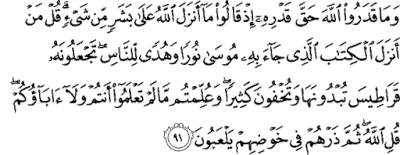(98)And it is He who produced you from one soul and [gave you] a place of dwelling and of storage. We have detailed the signs for a people who understand.
(6:98) This World is Only a Temporary Abode
[“And it is He who produced you from one soul,”] refers to Adam `alayhi salaam. The word mustaqar [مُسْتَقَرٌ] is from “qarar”. Qarar means to settle down. Therefore mustaqar denotes a place or time of rest, habitation or dwelling. The word mustawda’ [مُسْتَوْدَعٌ] means to keep something with someone temporarily for a few days for protection.
There are many probabilities in the interpretation of these two words. Some commentators say that mustaqar is the mother’s womb where the fetus stays and mustawda’ is the grave where a person stays temporarily for protection. If the body is not buried in the mud the corpse will rot. Others say mustaqar is the earth where a person lives and mustawda’ is the grave. A person stays in this dunya for some time and then moves on to the Akhirah.
(6:99) Don’t Just Eat Fruit But Also Reflect on its Different Stages
It is Allah subhanahu wa ta`ala Who sends down water in due measure as a blessing and provision for the servants, relief and means of survival for the creatures and mercy from Allah for His creation. Through this water come out nabaat [نَبَاتَ] meaning plantation, vegetation or anything that the earth produces. As result of the rain different types of plantation comes out and the earth becomes lush and green. We may be watering our plants every day but one rain shower refreshes up everything
From the green produce and trees, seeds and fruit grow lined on top of each other in clusters like an ear or spike of grain.
- We see grapes that are bunched together.
- There is corn on the cob arranged one next to the other.
- When we open a pomegranate it’s all piled up one on another.
As the fruit ripens it comes lower and lower within our reach to be easily picked up for eating.
The fruits appear similar yet their taste is so different. For example the leaves are similar in shape and appearance, yet different in the shape and taste. And the kind of fruit each plant produces is different. There are green grapes as well as purple grapes, and so many types of berries. They receive the same water but bring forth so much variety for us.
Allah subhanahu wa ta`ala ends the ayah by advising us to not just eat fruit but reflect on it. Reflect on its different stages. The fruit doesn’t grow in an instant. First the plant sprouts from the seed, then the flowers appears, then small fruits begin to show up and then we wait for their ripening till we can eat them. Contemplate the ability of the Creator of these fruits, Who brought them into existence after they were dry wood, and they later became grapes and dates; and similar is the case with the various colors, shapes, tastes and fragrance of whatever Allah created. In these are signs and proofs that testify to the perfect ability, wisdom and mercy of He Who created these things for people who believe in Allah and obey His Messengers.
(6:100) Rebuking the Idolaters
Ayah 100 refutes the idolaters who worshipped others besides Allah subhanahu wa ta`ala and associated the Jinns with Him in worship. One might ask how did the idolaters worship the Jinns? Here, we should remember that just like there are good people and bad people similarly there are good Jinns and bad Jinns. Some are obedient to Allah while some are disobedient to Him. The mushrikeen of Makkah worshipped the idols by obeying the Jinns who commanded them to do so. When people went out on night journeys they would call out to the Jinns for protection. Calling out to someone for help other than Allah is Shirk.
In Surah Saba Ayah 41, Allah subhanahu wa ta`ala mentions that on the Day of Resurrection, the angels will proclaim, “Rather, they used to worship the jinn; most of them were believers in them.” Earlier in Surah an-Nisa Ayah 117we learnt, “They call upon instead of Him none but female [deities], and they [actually] call upon none but a rebellious Shaytan.” This is why Allah subhanahu wa ta`ala said here [in Ayah 100], وَخَلَقَهُمْ “…while He has created them…” Allah subhanahu wa ta`ala is the One Who created the Jinns, then how is it possible that they be worshipped? How can the creation be equal to the Creator? Jinns are a creation of Allah, should one worship the creation or the Creator? How can another deity be worshipped along with Him while He created everything?
The word, Kharaqu [خَرَقُواْ], means “falsely attributed, invented, claimed and lied”. Allah subhanahu wa ta`ala then mentions the misguidance of those who were led astray and claimed a son or offspring for Him, as the Jews did with `Uzayr, the Christians with `Eesa and the Arab pagans with the angels whom they claimed were Allah’s daughters. Allah subhanahu wa ta`ala is far holier than what the unjust, polytheist people associated with Him.
(6:101) Meaning of Badi’
Allah subhanahu wa ta`ala says that He is the Badi’ [بَدِيعُ] of the heavens and the earth, meaning He originated, created, invented and brought them into existence without precedence. The word Bid`ah used for innovation also comes from the same word because it is something that did not have a precedence. Until Allah subhanahu wa ta`ala created the heavens and the earth there was nothing like them from before. He is their innovator.
If Allah alone is the Badi’, “How could He have a son when He does not have a companion and He created all things?” A child is the offspring of two compatible spouses. When Allah subhanahu wa ta`ala does not have a spouse from where can the offspring come? Everything besides Allah is the creation, and if Allah subhanahu wa ta`ala is the Creator of everything then how can his child or spouse be a creation? How can He have a wife from His creation who is suitable for His majesty, when there is none like Him? How can He have a child? How can His creation equal Him in status? Allah does not have an equal, none of His creatures are similar to Him, for He alone created the entire creation.
In Surah Mariyam Ayaat 88 and 89, Allah subhanahu wa ta`ala says, “And they say, ‘The Most Merciful has taken [for Himself] a son.’ You have done an atrocious thing.”
Allah subhanahu wa ta`ala has created everything. He is Glorified above having a son. Allah is All-Knower of all things. Those who are worshipped besides Allah are not aware of everything.
(6:102) Allah is Your Lord
Allah is the Creator of everything while the Jinns are not the khaliq. They are makhlooq – a creation of Allah subhanahu wa ta`ala. Therefore worship only Him, attest to His Oneness and affirm that there is no deity worthy of worship except Him because He created everything. He is the Trustee, Watcher and Disposer of affairs for all things in existence, giving them provisions and protection by day and night.
Lessons to be learnt:
– We learn that the beginning of humanity was from one man. Believing in this is part of our emaan. It is humiliating to attribute man’s evolution from an animal.
– For each person there is a mustaqar and mustawda’; a beginning and an end. We focus so much on the beginning and ignore the end. Parents plan baby showers and create baby books for their children. When they grow up they show them, “This is when you were born. These were your first words,” and so on. But we don’t say a word about the Hereafter. The final and eternal home. We keep preparing them for this life but not the next while this life is only temporary.
– In the Qur’an and in the universe, Allah subhanahu wa ta`ala has placed many signs for people to recognize their Creator. The one who wants to take benefit will benefit and the one who turns a blind eye will only harm himself.























